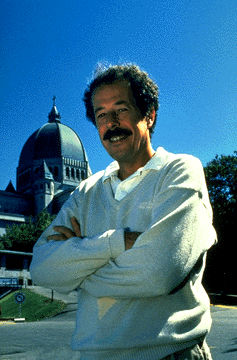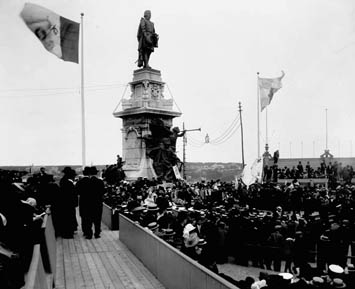Article
Quebec City in the War of 1812
Quebec City's strategic location on the ST LAWRENCE RIVER determined the nature of its development. In the age of sail, it held a dominant position as a port of entry and exit for ocean-going vessels.

Enter your search term
Signing up enhances your TCE experience with the ability to save items to your personal reading list, and access the interactive map.
Create AccountArticle
Quebec City's strategic location on the ST LAWRENCE RIVER determined the nature of its development. In the age of sail, it held a dominant position as a port of entry and exit for ocean-going vessels.
"https://www.thecanadianencyclopedia.ca/images/tce_placeholder.jpg?v=e9dca980c9bdb3aa11e832e7ea94f5d9" // resources/views/front/categories/view.blade.phphttps://www.thecanadianencyclopedia.ca/images/tce_placeholder.jpg?v=e9dca980c9bdb3aa11e832e7ea94f5d9

Article
From 10–27 October 1864, politicians from the five British North American colonies gathered in Quebec City to continue discussing their unification into a single country. These discussions began at the Charlottetown Conference the previous month. The most important issues decided in Quebec City were the structure of Parliament and the distribution of powers between the federal and provincial governments. The broad decisions from the Charlottetown and Quebec conferences were made into 72 resolutions, known as the Quebec Resolutions. These formed the basis of Confederation and of Canada’s Constitution.
"https://d3d0lqu00lnqvz.cloudfront.net/media/media/1e88decf-02d6-4b89-b522-383f360ecac4.jpg" // resources/views/front/categories/view.blade.phphttps://d3d0lqu00lnqvz.cloudfront.net/media/media/1e88decf-02d6-4b89-b522-383f360ecac4.jpg

Article
From 10–27 October 1864, leaders from the five British North American colonies met in Quebec City. They continued to talk about merging into a single country. These talks had begun at the Charlottetown Conference the month before. At Quebec City, the Fathers of Confederation chose how the new Parliament would be structured. They also worked out the division of powers between the federal and provincial governments. The decisions that were made in Charlottetown and Quebec formed 72 resolutions. They were known as the Quebec Resolutions. They formed the basis of Confederation and of Canada’s Constitution. This article is a plain-language summary of the Quebec Conference, 1864. If you would like to read about this topic in more depth, please see our full-length entry: Quebec Conference, 1864.
"https://d3d0lqu00lnqvz.cloudfront.net/media/media/1e88decf-02d6-4b89-b522-383f360ecac4.jpg" // resources/views/front/categories/view.blade.phphttps://d3d0lqu00lnqvz.cloudfront.net/media/media/1e88decf-02d6-4b89-b522-383f360ecac4.jpg

Editorial
The following article is an editorial written by The Canadian Encyclopedia staff. Editorials are not usually updated. There was no media circus surrounding the conference. The press was banned from the discussions, so the newspaper reports said a great deal about the miserable October weather, but precious little about what was discussed in the meetings.
"https://d3d0lqu00lnqvz.cloudfront.net/media/media/1eda021b-6ecb-4d9c-99cc-7cc3a1cee783.jpg" // resources/views/front/categories/view.blade.phphttps://d3d0lqu00lnqvz.cloudfront.net/media/media/1eda021b-6ecb-4d9c-99cc-7cc3a1cee783.jpg

Article
King himself was most comfortable playing host to the conferences in Québec, and he was amply photographed and filmed with Churchill and Roosevelt.
"https://d3d0lqu00lnqvz.cloudfront.net/media/media/0e3038c4-afb4-4a8b-acdb-3ece6a061304.jpg" // resources/views/front/categories/view.blade.phphttps://d3d0lqu00lnqvz.cloudfront.net/media/media/0e3038c4-afb4-4a8b-acdb-3ece6a061304.jpg

Article
This entry presents an overview of Québec cinema, from the burgeoning of a distinctly Québec cinema in the 1970s, to the production explosion that followed Denys Arcand’s Le déclin de l’empire américain (1986). It highlights the most important films, whether in terms of box office success or international acclaim, and covers both narrative features and documentaries. It also draws attention to an aspect of filmmaking that still has difficulty finding its place: women's cinema.
"https://d3d0lqu00lnqvz.cloudfront.net/media/media/aa8cc00a-320d-4447-bb88-20c45fede6e0.jpg" // resources/views/front/categories/view.blade.phphttps://d3d0lqu00lnqvz.cloudfront.net/media/media/aa8cc00a-320d-4447-bb88-20c45fede6e0.jpg

Article
The Québec referendum of 1980, on the Parti Québécois government’s plans for sovereignty-association, was held in fulfilment of a promise that the party had made to do so, during the 1976 election campaign that brought it to power. In this referendum, the government asked the people of Québec to give it a mandate to “negotiate a new constitutional agreement with the rest of Canada, based on the equality of nations.” When the votes were counted, nearly 60% of Quebecers had voted against this plan, and it was thereby rejected. If the “Yes” side had won, the results of the negotiations would have been submitted to a second referendum. The 1980 referendum was followed by constitutional negotiations that have left an indelible mark on the Canadian political scene.
"https://d3d0lqu00lnqvz.cloudfront.net/media/media/45169da4-a3a7-41ba-ad97-65c511d23411.jpg" // resources/views/front/categories/view.blade.phphttps://d3d0lqu00lnqvz.cloudfront.net/media/media/45169da4-a3a7-41ba-ad97-65c511d23411.jpg

Article
Held on 30 October 1995, the referendum on Québec sovereignty was settled by a narrow victory for the “No” camp — as had been the case in the 1980 referendum.
"https://d3d0lqu00lnqvz.cloudfront.net/media/media/2dc07cb0-897b-47b0-8e75-0bcdac4d6705.jpg" // resources/views/front/categories/view.blade.phphttps://d3d0lqu00lnqvz.cloudfront.net/media/media/2dc07cb0-897b-47b0-8e75-0bcdac4d6705.jpg

Article
The Quebec Resolutions are a list of 72 policy directives that formed the basis of Canada’s Constitution. They emerged from the Charlottetown Conference (1–9 September 1864) and the Quebec Conference (10–27 October 1864). Those meetings were held by politicians from the five British North American colonies to work out the details of how they would unite into a single country. (See also: Confederation.) The Quebec Resolutions were finalized at the London Conference (4 December 1866 to March 1867). They formed the basis of the British North America Act — the first building block of Canada’s Constitution — which established the Dominion of Canada on 1 July 1867.
"https://d3d0lqu00lnqvz.cloudfront.net/media/media/3bac7236-85c5-44fe-8cea-2d0c2948c5df.jpg" // resources/views/front/categories/view.blade.phphttps://d3d0lqu00lnqvz.cloudfront.net/media/media/3bac7236-85c5-44fe-8cea-2d0c2948c5df.jpg

Article
The Quebec Resolutions are a list of 72 policy points. They formed the basis of Canada’s Constitution. They emerged from the Charlottetown Conference and the Quebec Conference in the fall of 1864. Those meetings were held by leaders from the five British North American colonies. They worked out the details of how they would unite into a single country. (See Confederation.) The Quebec Resolutions were finalized at the London Conference in 1867. They formed the basis of the British North America Act (now called the Constitution Act, 1867). It was the first building block of Canada’s Constitution. It created the Dominion of Canada on 1 July 1867. This article is a plain-language summary of the Quebec Resolutions. If you would like to read about this topic in more depth, please see our full-length entry: Quebec Resolutions.
"https://d3d0lqu00lnqvz.cloudfront.net/media/media/3bac7236-85c5-44fe-8cea-2d0c2948c5df.jpg" // resources/views/front/categories/view.blade.phphttps://d3d0lqu00lnqvz.cloudfront.net/media/media/3bac7236-85c5-44fe-8cea-2d0c2948c5df.jpg

Article
The Reference re Secession of Quebec was a reference case of the Supreme Court of Canada. It came after the 1995 Quebec referendum. The Court was faced with the question of whether Quebec could decide on its own to secede from Canada.
"https://d3d0lqu00lnqvz.cloudfront.net/media/media/7ac02b0f-118b-4ccb-b6dc-81f218b68954.jpg" // resources/views/front/categories/view.blade.phphttps://d3d0lqu00lnqvz.cloudfront.net/media/media/7ac02b0f-118b-4ccb-b6dc-81f218b68954.jpg

Article
When the Canadian Confederation was established in 1867, provisions were made for the creation of a provincial government in Québec, the only region with a majority French-speaking population. This distinctive identity has exerted a profound influence on all facets of Québec’s history and continues to fuel debate about the province’s future.
"https://d3d0lqu00lnqvz.cloudfront.net/media/media/26cf09fc-e503-45c3-ae5a-f30684869e3c.jpg" // resources/views/front/categories/view.blade.phphttps://d3d0lqu00lnqvz.cloudfront.net/media/media/26cf09fc-e503-45c3-ae5a-f30684869e3c.jpg

Macleans
It was the moment when a bad week for the Liberal government's Quebec strategy got worse.This article was originally published in Maclean's Magazine on March 2, 1998
"https://www.thecanadianencyclopedia.ca/images/tce_placeholder.jpg?v=e9dca980c9bdb3aa11e832e7ea94f5d9" // resources/views/front/categories/view.blade.phphttps://www.thecanadianencyclopedia.ca/images/tce_placeholder.jpg?v=e9dca980c9bdb3aa11e832e7ea94f5d9

Editorial
The following article is an editorial written by The Canadian Encyclopedia staff. Editorials are not usually updated.
"https://d3d0lqu00lnqvz.cloudfront.net/media/media/13a67c95-5fb2-4449-8e79-1a42d810c1c7.jpg" // resources/views/front/categories/view.blade.phphttps://d3d0lqu00lnqvz.cloudfront.net/media/media/13a67c95-5fb2-4449-8e79-1a42d810c1c7.jpg

Article
On the plans which he had prepared for the construction of the Hôtel du Parlement de Québec (Québec's parliament buildings), Eugène-Étienne Taché took the initiative to inscribe, under the provincial coat of arms above the main door, a MOTTO of his own invention: Je me souviens (I remember).
"https://www.thecanadianencyclopedia.ca/images/tce_placeholder.jpg?v=e9dca980c9bdb3aa11e832e7ea94f5d9" // resources/views/front/categories/view.blade.phphttps://www.thecanadianencyclopedia.ca/images/tce_placeholder.jpg?v=e9dca980c9bdb3aa11e832e7ea94f5d9
